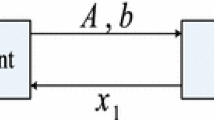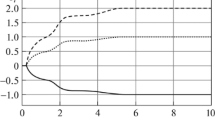Abstract
This paper considers the parameter identification problem of the state space observer canonical model for linear stochastic systems, and proposes a Kalman filter-based gradient iterative algorithm and an observer-based multi-innovation stochastic gradient algorithm. The fundamental idea is to replace the unmeasurable states in the information vector with the estimated states and to compute the states of the systems through the Kalman filter or the state observer using the previous parameter estimates. Examples are provided to confirm the effectiveness of the proposed algorithms.




Similar content being viewed by others
References
A. Chen, Z. Zhou, X. Xu, A self-adaptive gradient projection algorithm for the nonadditive traffic equilibrium problem. Comput. Oper. Res. 39(2), 127–138 (2012)
Z. Dai, F. Wen, Another improved Wei–Yao–Liu nonlinear conjugate gradient method with sufficient descent property. Appl. Math. Comput. 218(14), 7421–7430 (2012)
M. Dehghan, M. Hajarian, An iterative algorithm for the reflexive solutions of the generalized coupled Sylvester matrix equations and its optimal approximation. Appl. Math. Comput. 202(2), 571–588 (2008)
M. Dehghan, M. Hajarian, Convergence of the descent Dai–Yuan conjugate gradient method for unconstrained optimization. J. Vib. Control 18(9), 1249–1253 (2012)
M. Dehghan, M. Hajarian, Fourth-order variants of Newton’s method without second derivatives for solving non-linear equations. Eng. Comput. 29(4), 356–365 (2012)
F. Ding, T. Chen, Performance analysis of multi-innovation gradient type identification methods. Automatica 43(1), 1–14 (2007)
J. Ding, C.X. Fan, J.X. Lin, Auxiliary model based parameter estimation for dual-rate output error systems with colored noise. Appl. Math. Model. 37(6), 4051–4058 (2013)
F. Ding, System Identification: New Theory and Methods (Science Press, Beijing, 2013)
J. Ding, J.X. Lin, Modified subspace identification for periodically non-uniformly sampled systems by using the lifting technique. Circuits Syst. Signal Process. 33(5), 1439–1449 (2014)
F. Ding, System Identification: Performances Analysis for Identification Methods (Science Press, Beijing, 2014)
F. Ding, State filtering and parameter identification for state space systems with scarce measurements. Signal Process. 104, 369–380 (2014)
F. Ding, Hierarchical parameter estimation algorithms for multivariable systems using measurement information. Inf. Sci. 277, 396–405 (2014)
F. Ding, Combined state and least squares parameter estimation algorithms for dynamic systems. Appl. Math. Model. 38(1), 403–412 (2014)
Y. Gu, F. Ding, J.H. Li, State filtering and parameter estimation for linear systems with d-step state-delay. IET Signal Process. 8(6), 639–646 (2014)
Y. Gu, F. Ding, J.H. Li, States based iterative parameter estimation for a state space model with multi-state delays using decomposition. Signal Process. 106, 294–300 (2015)
Y.B. Hu, Iterative and recursive least squares estimation algorithms for moving average systems. Simul. Model. Pract. Theory 34, 12–19 (2013)
Y.B. Hu, B.L. Liu, Q. Zhou, C. Yang, Recursive extended least squares parameter estimation for Wiener nonlinear systems with moving average noises. Circuits Syst. Signal Process. 33(2), 655–664 (2014)
Y.B. Hu, B.L. Liu, Q. Zhou, A multi-innovation generalized extended stochastic gradient algorithm for output nonlinear autoregressive moving average systems. Appl. Math. Comput. 247, 218–224 (2014)
Y.J. Liu, Y.S. Xiao, X.L. Zhao, Multi-innovation stochastic gradient algorithm for multiple-input single-output systems using the auxiliary model. Appl. Math. Comput. 215(4), 1477–1483 (2009)
X.Y. Liu, A.L. Zhang, Y.L. Gao et al., A novel hybrid immune algorithm and its convergence based on the steepest descent algorithm. Appl. Math. Comput. 218(4), 1291–1296 (2011)
H. Liu, Y. Yuan, A gradient based iterative algorithm for solving model updating problems of gyroscopic systems. Appl. Math. Model. 36(10), 4810–4816 (2012)
Y.J. Liu, F. Ding, Y. Shi, An efficient hierarchical identification method for general dual-rate sampled-data systems. Automatica 50(3), 962–970 (2014)
X.L. Luan, P. Shi, F. Liu, Stabilization of networked control systems with random delays. IEEE Trans. Ind. Electron. 58(9), 4323–4330 (2011)
X.L. Luan, S.Y. Zhao, F. Liu, H-infinity control for discrete-time markov jump systems with uncertain transition probabilities. IEEE Trans. Autom. Control 58(6), 1566–1572 (2013)
H.W. Mei, L.Y. Wang, G. Yin, Almost sure convergence rates for system identification using binary, quantized, and regular sensors. Automatica 50(8), 2120–2127 (2014)
G. Mercére, L. Bako, Parameterization and identification of multivariable state-space systems: a canonical approach. Automatica 47(8), 1547–1555 (2011)
J. Paduart, L. Lauwers, R. Pintelon et al., Identification of a Wiener–Hammerstein system using the polynomial nonlinear state space approach. Control Eng. Pract. 20(11), 1133–1139 (2012)
S. Saat, S.K. Nguang, C.M. Lin, Z. Zakaria, Robust nonlinear H_infinity state feedback control of polynomial discrete-time systems: an integrator approach. Circuits Syst. Signal Process. 33(2), 331–346 (2014)
T.B. Schön, A. Wills, B. Ninness, System identification of nonlinear state-space models. Automatica 47(1), 39–49 (2011)
Y. Shi, H. Fang, Kalman filter based identification for systems with randomly missing measurements in a network environment. Int. J. Control 83(3), 538–551 (2010)
Y. Shi, B. Yu, Robust mixed H_2/H_infinity control of networked control systems with random time delays in both forward and backward communication links. Automatica 47(4), 754–760 (2011)
P. Shi, X.L. Luan, F. Liu, H-infinity filtering for discrete-time systems with stochastic incomplete measurement and mixed delays. IEEE Trans. Ind. Electron. 59(6), 2732–2739 (2012)
A. Tulsyan, B. Huang, R.G. Bhushan et al., On simultaneous on-line state and parameter estimation in non-linear state-space models. J. Process Control 23(4), 516–526 (2013)
J. Vörös, Identification of nonlinear cascade systems with time-varying backlash. J. Electr. Eng. 62(2), 87–92 (2011)
D.Q. Wang, Least squares-based recursive and iterative estimation for output error moving average systems using data filtering. IET Control Theory Appl. 5(14), 1648–1657 (2011)
D.Q. Wang, F. Ding, Y.Y. Chu, Data filtering based recursive least squares algorithm for Hammerstein systems using the key-term separation principle. Inf. Sci. 222, 203–212 (2013)
C. Wang, T. Tang, Recursive least squares estimation algorithm applied to a class of linear-in-parameters output error moving average systems. Appl. Math. Lett. 29, 36–41 (2014)
C. Wang, T. Tang, Several gradient-based iterative estimation algorithms for a class of nonlinear systems using the filtering technique. Nonlinear Dyn. 77(3), 769–780 (2014)
J.M. Xu, Y.R. Nan, G.J. Zhang, L.L. Ou, H.J. Ni, Delay-dependent H_infinity control for uncertain 2-D discrete systems with state delay in the roesser model. Circuits Syst. Signal Process. 32(3), 1097–1112 (2013)
Y.Y. Yin, F. Liu, P. Shi, Finite-time gain-scheduled control on stochastic bioreactor systems with partially known transition jump rates. Circuits Syst. Signal Process. 30(3), 609–627 (2011)
J.F. Yin, Y. Zhang, Alternative gradient algorithms for computing the nearest correlation matrix. Appl. Math. Comput. 219(14), 7591–7599 (2013)
B. Zhou, G.R. Duan, Z.Y. Li, Gradient based iterative algorithm for solving coupled matrix equations. Syst. Control Lett. 58(5), 327–333 (2009)
D.Q. Zhu, M. Kong, Adaptive fault-tolerant control of nonlinear system: an improved CMAC based fault learning approach. Int. J. Control 80(10), 1576–1594 (2007)
D.Q. Zhu, Q. Liu, Z. Hu, Fault-tolerant control algorithm of the manned submarine with multi-thruster based on quantum behaved particle swarm optimization. Int. J. Control 84(11), 1817–1829 (2012)
D.Q. Zhu, H. Huang, S.X. Yang, Dynamic task assignment and path planning of multi-AUV system based on an improved self-organizing map and velocity synthesis method in 3D underwater workspace. IEEE Trans. Cybern. 43(2), 504–514 (2013)
Acknowledgments
This work was supported by the National Natural Science Foundation of China (No. 61273194) and the PAPD of Jiangsu Higher Education Institutions.
Author information
Authors and Affiliations
Corresponding author
Rights and permissions
About this article
Cite this article
Ma, X., Ding, F. Gradient-Based Parameter Identification Algorithms for Observer Canonical State Space Systems Using State Estimates . Circuits Syst Signal Process 34, 1697–1709 (2015). https://doi.org/10.1007/s00034-014-9911-5
Received:
Revised:
Accepted:
Published:
Issue Date:
DOI: https://doi.org/10.1007/s00034-014-9911-5




